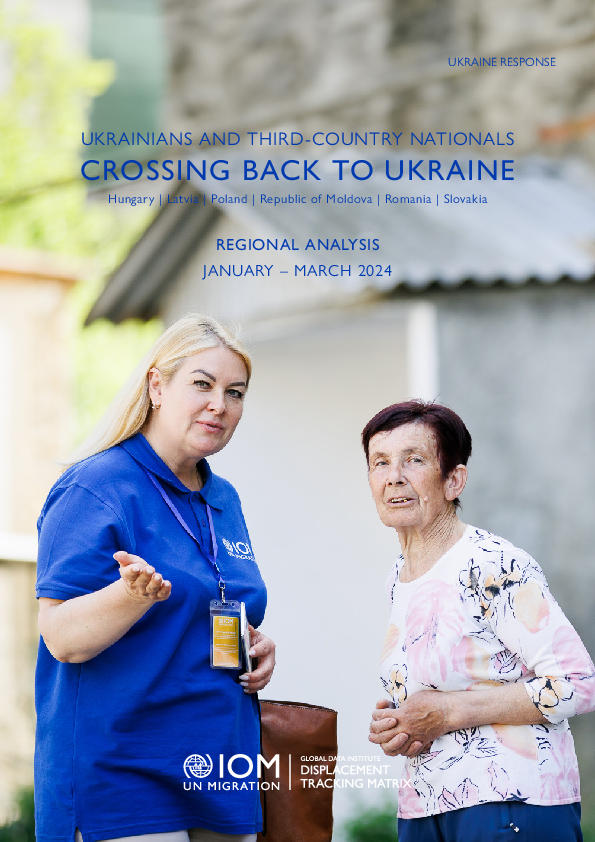-
Countries
-
Data and Analysis
-
Special Focus
-
Crisis Responses
Return Intention

Contact
DTMUkraine@iom.int
Language
English
Location
Ukraine
Period Covered
Apr 15 2024
May 31 2024
Activity
- Return Intention
- Mobility Tracking
The Conditions of Return Assessment (CoRA) provides granular and actionable data on the conditions of returns in Ukraine, using a multisectoral location-level assessment (MSLA) methodology conducted with local authority key informants in areas of return across Ukraine. CoRA presents an analysis of the situation and needs of returnees in Ukraine, exploring the circumstances under which returns are taking place, and settlement-level conditions for all population groups, aiming to support evidence-based interventions that address the specific needs of returnees. Data collection for Round 8 took place between 15 April and 31 May 2024 across 858 locations in 284 hromadas in 23 oblasts in Ukraine.

Contact
iomkyrgyzstan@iom.int
Language
English
Location
Kazakhstan
Period Covered
Feb 01 2024
Feb 29 2024
Activity
- Survey
- Return Intention
- Mobility Tracking
- Baseline Assessment
В ходе третьего раунда опроса международных трудящихся-мигрантов, проведенного в семи регионах и трех провинциальных городах, были опрошены 1810 международных трудящихся-мигрантов. Используя метод снежного кома для получения информированного согласия, опрос охватывал демографические данные, социально-экономические характеристики, статус занятости, миграционные намерения, причины миграции, проблемы, с которыми сталкиваются на работе, доходы, денежные переводы, жилье, медицинские услуги, финансовое положение, информацию о правах, местная реинтеграция, влияние санкций и уязвимости. Основные результаты показали, что 32 процента респондентов имеют начальное среднее образование, 50 процентов являются основными кормильцами, 57 процентов не имеют пенсионных выплат, 50 процентов не имеют ежегодного отпуска, 41 процент работают без официальных контрактов и 55 процентов плотят аренду за проживание. Кроме того, 39 процентов заняты в строительном секторе, 70 процентов сталкиваются с высокими расходами на аренду, 26 процентов не имеют медицинских услуг, а 48 процентов переводят более половины своего дохода.

Contact
iomkyrgyzstan@iom.int
Language
English
Location
Kazakhstan
Period Covered
Jan 01 2024
Mar 31 2024
Activity
- Survey
- Return Intention
- Mobility Tracking
- Baseline Assessment
Ежеквартальный отчет был составлен путем объединения вторичных данных, полученных из различных источников, включая государственные органы, международные организации, некоммерческие организации и другие типы организаций. В частности, отчет за первый квартал 2024 года был составлен на основе данных МВД, Бюро национальной статистики и Пограничной службы Республики Казахстана. Данные были собраны на основе сочетания опубликованных источников и прямых запросов к партнерам и государственным учреждениям.
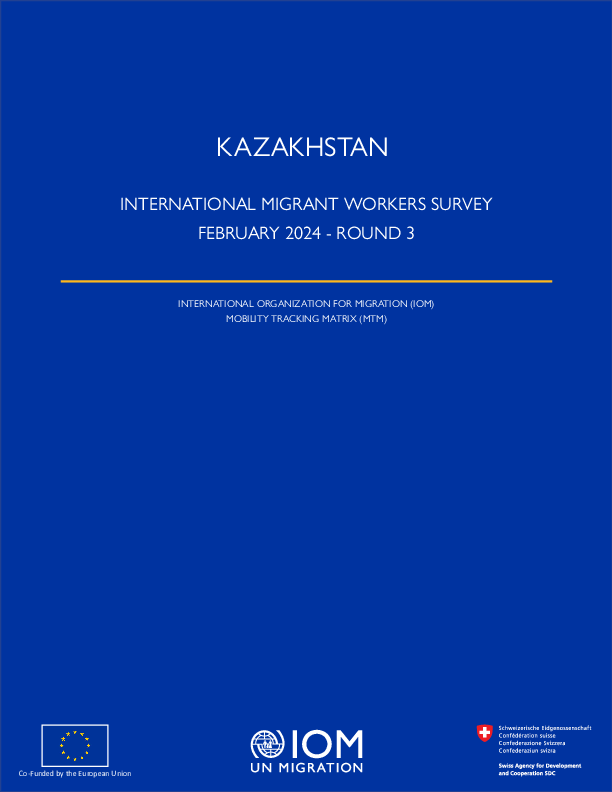
Contact
iomkyrgyzstan@iom.int
Language
English
Location
Kazakhstan
Period Covered
Feb 01 2024
Feb 29 2024
Activity
- Survey
- Return Intention
- Mobility Tracking
- Baseline Assessment
The third round of the International Migrant Worker Survey, conducted across seven regions and three provincial cities, interviewed 1,810 international migrant workers. Using the snowball method to secure informed consent, the survey covered demographics, socio-economic profiles, employment status, migration intentions, reasons for migration, challenges faced at work, income, remittances, housing, health services, financial status, rights information, local reintegration, the impact of sanctions, and vulnerabilities. Key findings revealed that 32 per cent of respondents have a lower secondary education, 50 per cent are primary breadwinners, 57 per cent lack pension payments, 50 per cent have no annual leave, 41 per cent work without formal contracts, and 55 per cent pay rent for accommodation. Additionally, 39 per cent are employed in the construction sector, 70 per cent face high rent costs, 26 per cent lack health services, and 48 per cent remit over half their income.
This report presents evidence on persons crossing back to Ukraine from abroad distinguishing between those who aim to remain in the country for longer periods and those who plan to pay a short visit. Individuals planning to spend 0 to 30 days in Ukraine are categorized as “short-term visitors,” while those intending to stay longer than one month are identified as “prospective returnees.” The analysis is based on 4,938 surveys collected by DTM between January and March 2024 with adult individuals travelling to Ukraine from the neighbouring countries.
Key Findings:
- Among 4,903 Ukrainians, 92% were women and 8% were men.
- 25% of respondents were prospective returnees, 56% were short-term visitors and 19% were undecided.
- 56% stayed in neighbouring countries prior to crossing back
- Top reasons to cross back included: Meeting family members (53%), receiving medical care (2£%), returning after visiting someone abroad (18%), obtain/renew documents (13%), and reunite with family members (10%).
- 62% of respondents received aid while abroad.
- Top 5 needs included: Financial support (41%), personal safety and security (30%), health services (24%), medicines (19%) and employment (11%).
- For Third Country Nationals (TCNs), 89% left Ukraine because of the war and 83% resided in Ukraine for more than 5 years prior to displacement.
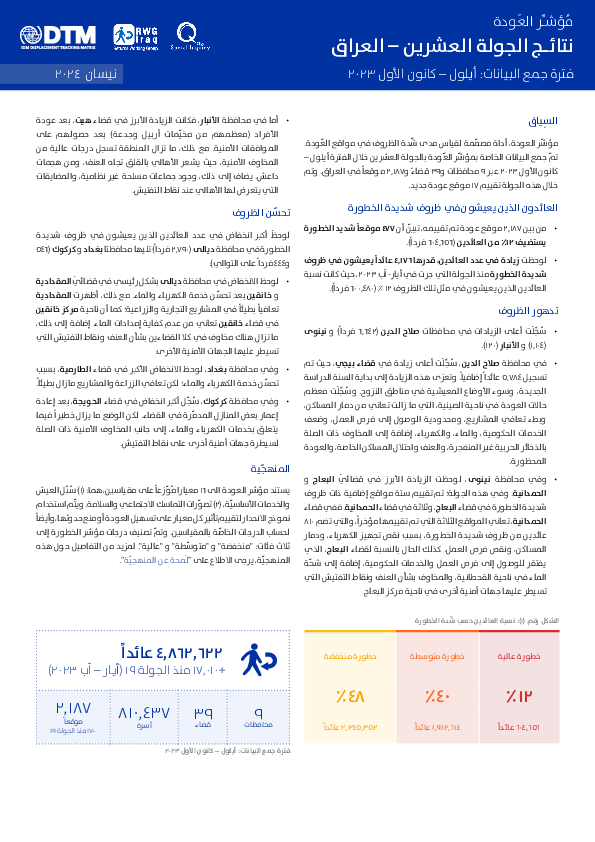
Contact
DTM Iraq, IraqDTM@iom.int
Language
Arabic
Location
Iraq
Period Covered
Sep 01 2023
Dec 31 2023
Activity
- Survey
- Return Intention
- Mobility Tracking
- Baseline Assessment
he Return Index report (Arabic translation) provides triannual updates on the severity of conditions in locations of return using 16 indicators across two domains: (1) livelihoods and basic services, and (2) social cohesion and safety perceptions.
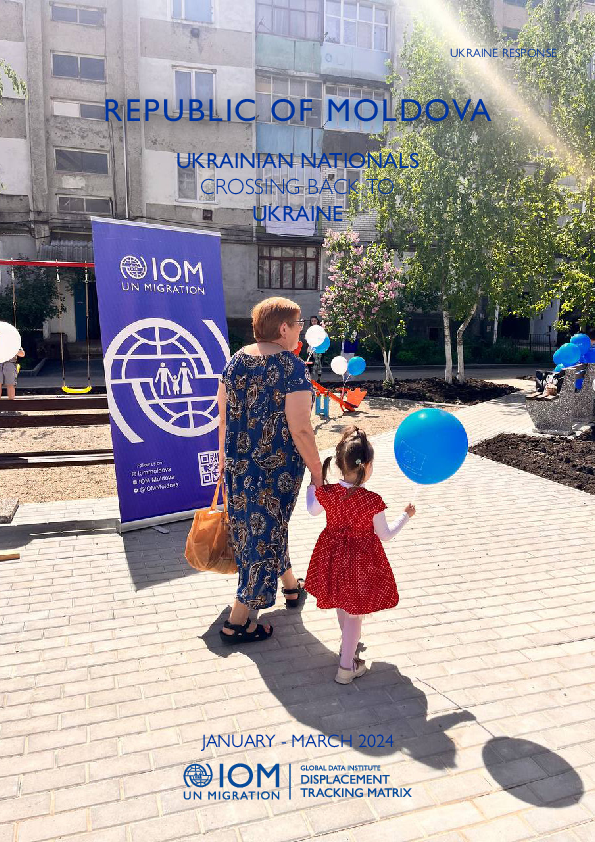
Contact
DTM Europe, DTMMediterranean@iom.int
Language
English
Location
Republic of Moldova
Period Covered
Jan 01 2024
Mar 31 2024
Activity
- Survey
- Return Intention
- Flow Monitoring
IOM’s Displacement Tracking Matrix (DTM) collects data on Ukrainian nationals and Third-Country Nationals (TCNs) that were crossing back to Ukraine from or through the Republic of Moldova, either for temporary stay or prospective return. The survey focuses on the return intentions, duration of displacement, destinations, assistance, and experiences of unequal treatment of the respondents. A total of 1,800 surveys were collected between January and March 2024.
Key findings:
- 87% of Ukrainian respondents planned to go for a short visit, 7% intended to stay in Ukraine (prospective returnees), while 6% were not sure about their intentions.
- The majority (69%) been residing in the Republic of Moldova, 9% in Romania, 5% in Germany. The remaining 17% stayed in other countries.
- 83% were going back to their Oblast of origin, while 17% were going back to a different Oblast.
- 43% had been displaced between January and June 2022.
- 67% crossed back to Ukraine twice or more since 2022. 10% crossed more than 10 times.
- 79% of prospective returnees and 91% of short-term visitors reported having received assistance since their displacement.
- Main priority needs that were cited by respondents include financial support (43%), medicine and health services (27%) and personal safety and security (22%).
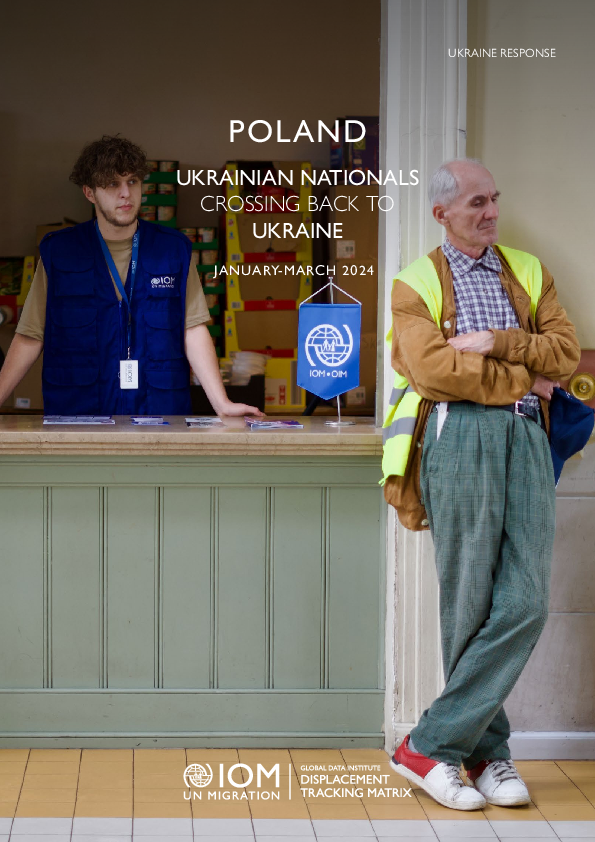
Contact
DTM Europe, DTMMediterranean@iom.int
Language
English
Location
Poland
Period Covered
Jan 01 2024
Mar 31 2024
Activity
- Survey
- Return Intention
- Flow Monitoring
IOM’s Displacement Tracking Matrix (DTM) collected data on Ukrainian nationals and Third-Country Nationals (TCNs) who crossed back to Ukraine from Poland, either for a temporary stay or permanent return after a period of displacement abroad. The survey focuses on the return intentions, duration of displacement, destinations, assistance, and experiences of discrimination of 361 Ukrainian respondents surveyed between January and March 2024.
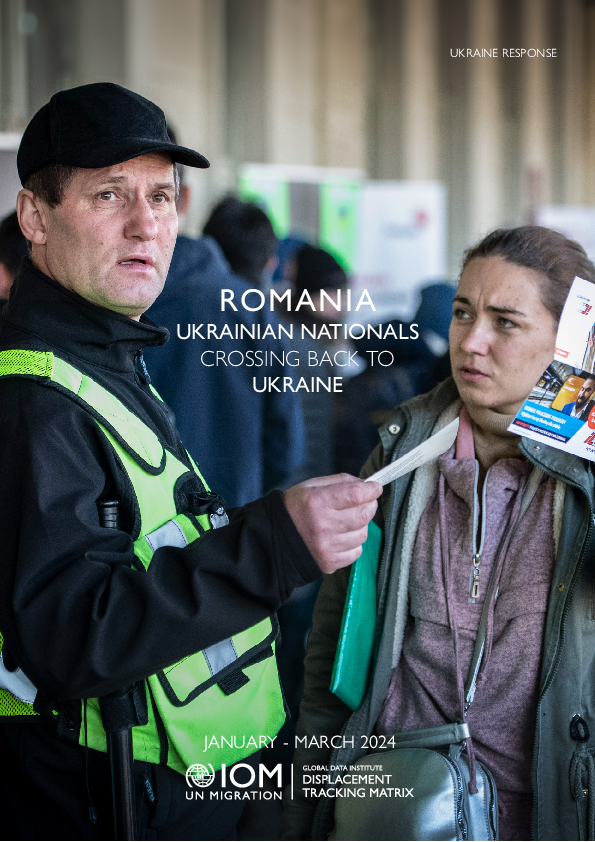
Contact
DTM Europe, DTMMediterranean@iom.int
Language
English
Location
Romania
Period Covered
Jan 01 2024
Mar 31 2024
Activity
- Survey
- Return Intention
- Flow Monitoring
IOM’s Displacement Tracking Matrix (DTM) collected data on Ukrainian nationals and TCNs (resided in Ukraine before 24 February 2022) that were crossing back to Ukraine from or through Romania, either temporarily or permanently. The survey focuses on the return intentions, duration of displacement, destinations, assistance, and experiences of discrimination of respondents. A total of 1,298 surveys were collected between January and March 2024. Among these, less than one per cent (n=11) were completed by TCNs, while the vast majority, comprising over 99 per cent (n=1,287), were completed by Ukrainian nationals. The analysis presented in this report is based on the responses provided by Ukrainian nationals.
Before crossing back into Ukraine, individuals commonly stayed in Romania (57%), other EU countries (36%) or non-EU countries (6%). Aside from Romania, other countries of residence were Bulgaria (18%), Germany (6%), Italy (4%) or Turkey (3%).
The travel intentions of the surveyed Ukrainian nationals show that most respondents (63%) were “short-term visitors”, while 15 per-cent were prospective returnees. Another 22 per cent were not sure regarding their visit period. Also, most UA citizens were travelling back to their oblast of origin (985%), with most respondents originating from Odeska, Chernivetska, City of Kiyv Mykolaivska or Kersonska.
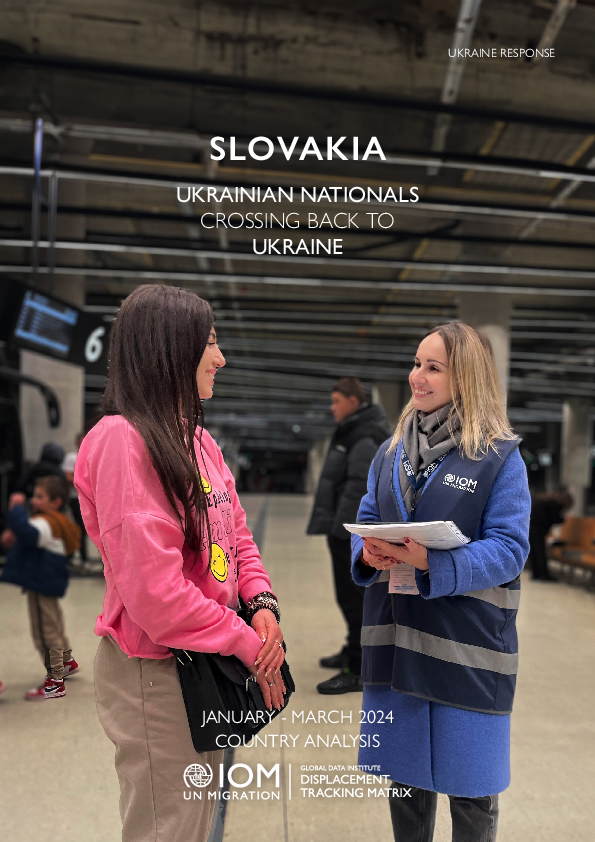
Contact
DTM Europe, DTMMediterranean@iom.int
Language
English
Location
Slovakia
Period Covered
Jan 01 2024
Mar 31 2024
Activity
- Survey
- Return Intention
- Flow Monitoring
IOM’s Displacement Tracking Matrix (DTM) collected data on Ukrainian nationals and Third-Country Nationals (TCNs) that crossed back to Ukraine from or through Slovakia, either temporarily or permanently. The survey focuses on the return intentions, duration of displacement, destinations, assistance, and experiences of discrimination of respondents. A total of 1,335 surveys were collected between January and March 2024.
Key findings:
- 27% of Ukrainian respondents intend to stay in Ukraine (prospective returnees), while 68% plan to go for a short visit.
- The share of those intending to return to Ukraine is higher among men than women (49% vs 25%). Women are more likely to be crossing into Ukraine for a short visit than men (69% vs 44%).
- Most of the short-term visitors plan to stay in their own home in Ukraine (78% overall), while others report to be going to their relatives’ homes (10%), finding other private solutions (7%) or staying with friends (4%). The share of those planning to stay at home is higher among prospective returnees (98%) than among short-term visitors (78%).
- Reasons for returning for prospective returnees include: visit relatives or close friends (75%), meet with family members (6%), reunite with their family (6%).
- Reasons for returning for short-term visitors include: visit family members (76%), healthcare (26%), reunite with family (21%).
- 64% of the Ukrainian nationals originate from seven regions in Ukraine: Zakarpatska (21%), Kyiv (13%), Kharkivska (8%), Dnipropetrovska (8%), Odeska (6%), Zaporizka (3%), and Mykolaivska (3%). The remaining 36% of respondents come from another 20 regions across Ukraine.
Pagination
- Page 1
- Next page
